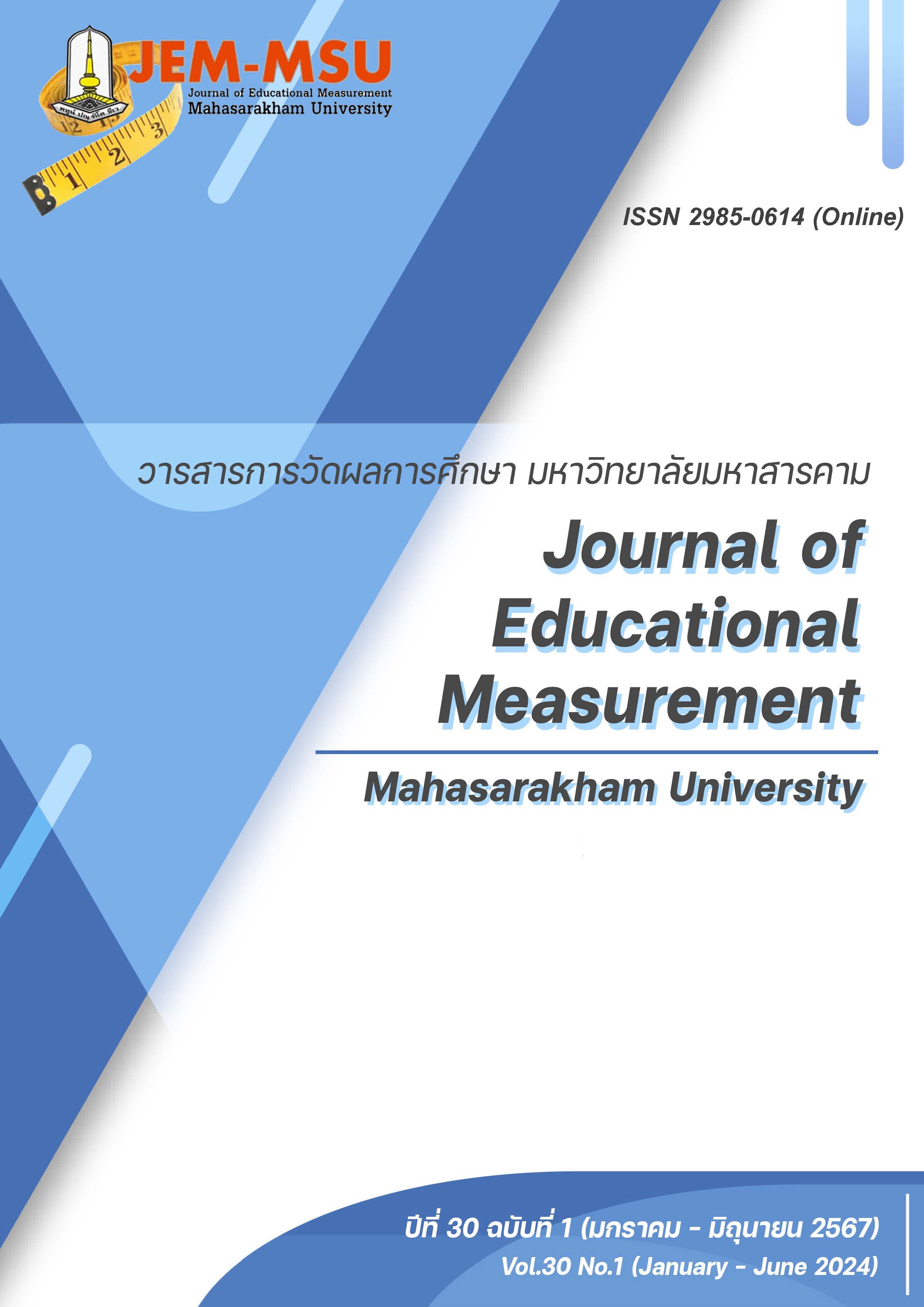An Application of Latent Profile Analysis in Group Classification and Study of the Relationship Between Assessment Literacy and Background of Teachers under the Office of the Private Education Commission of Chiang Mai Province
Main Article Content
Abstract
This research aimed to classify groups and study the relationship between assessment literacy and the background of teachers under the Office of the Private Education Commission of Chiang Mai Province, by studying 686 teachers obtained through multi-stage sampling. The research instruments included a 5-point rating scale questionnaire on teachers' assessment literacy, consisting of 80 items with an Item-Objective Congruence Index (IOC) ranging from 0.80 to 1.00, index of discrimination (rxy) ranging from 0.432 to 0.742, t-values ranging from 3.640 to 10.928, and a reliability () of 0.981. Data analysis employed latent profile analysis with the Mplus 7.4 program and Chi-square Analysis. The research findings were as follows:
The grouping of teachers based on their assessment literacy revealed that they could be classified into 3 groups. Group 1, the Accelerated Development Group in Assessment Literacy, had 58 teachers (8.455%). Group 2, the Basic Level Assessment Literacy Group, had 301 teachers (43.878%). Group 3, the Advanced Level Assessment Literacy Group, had 327 teachers (47.668%). (Ek=0.952, Likelihood=-2,356.576, AIC=3,493.660, BIC= 3,629.587, ABIC = 3,534.332, p-value=.005). Furthermore, the study revealed no significant relationship between gender, teaching experience, education level, and learning area groups with the differences in evaluation literacy groups. However, the level of education taught, the school setting, and the school size were significantly related at a significance level of .01.
Article Details

This work is licensed under a Creative Commons Attribution-NonCommercial-NoDerivatives 4.0 International License.
The content and information contained in the published article in the Journal of Educational Measurement Mahasarakham University represent the opinions and responsibilities of the authors directly. The editorial board of the journal is not necessarily in agreement with or responsible for any of the content.
The articles, data, content, images, etc. that have been published in the Journal of Educational Measurement Mahasarakham University are copyrighted by the journal. If any individual or organization wishes to reproduce or perform any actions involving the entirety or any part of the content, they must obtain written permission from the Journal of Educational Measurement Mahasarakham University.
References
Alkharusi, H. A. (2009). Correlates of teacher education students’ academic performance in an educational measurement course. The International Journal of Learning, 16(1), 1-15.
Allal, L. (2013). Teachers’ professional judgement in assessment: a cognitive act and a socially situated practice. Assessment in Education: Principles, Policy & Practice, 20(1), 20-34.
Brookhart, S. M. (2011). Educational assessment knowledge and skills for teachers. Educational Measurement: Issues and Practice, 30(1), 3-12.
Campbell, C., Murphy, J. A., & Holt, J. K. (2002). Psychometric analysis of an assessment Literacy instrument: Applicability to preservice teachers [Annual Meeting Paper]. Mid-Western Educational Research Association.
Koh, K. H. (2011). Improving teachers’ assessment Literacy through professional development. Teaching Education, 22(3), 255-276.
Lefcheck, J. S., Wilcox, D. J., Murphy, R. R., Marion, S. R., & Orth, R. J. (2017). Multiple stressors threaten the imperiled coastal foundation species eelgrass (Zostera marina) in Chesapeake Bay, USA. Global change biology, 23(9), 3474-3483.
Livingston, K., & Hutchinson, C. (2017). Developing teachers’ capacities in assessment through career-long professional learning. Assessment in Education: Principles, Policy & Practice, 24(2), 290-307.
Looney, A., Cumming, J., Kleij, F. V., & Harris, K. (2018). Reconceptualizing the role of teachers as assessors: teacher assessment identity. Assessment in Education: Principles, Policy & Practice, 25(5), 442-467.
Loveridge, C. E., & Cummings, S. H. (1996). Nursing management in the new paradigm. Aspen.
Mertler, C. A. (2009). Teachers’ assessment knowledge and their perceptions of the impact of classroom assessment professional development. Improving Schools, 12(2), 101-113.
Mertler, C.A., & Campbell, C. (2005). Measuring Teachers’ Knowledge & Application of Classroom Assessment Concepts: Development of the Assessment Literacy Inventory [Annual Meeting Paper]. The American Educational Research Association.
Plake, B. S., lmpara, J. C., & Fager, J. J. (1993). Assessment competencies of teachers: A national survey. Educational Measurement: Issues and Practice, 12(1), 10-12.
Stiggins, R. J. (1991). Relevant Classroom Assessment Training for Teachers. Educational Measurement: Issues and Practice, 10(1), 7-12. https://doi.org/10.1111/j.1745-3992.1991.tb00171.x
Stiggins, R. J. (2002). Assessment Crisis: The Absence of Assessment for Learning. Phi Delta Kappan, 83(10), 758-765. https://doi.org/10.1177/003172170208301010
Tein, J. Y., Coxe, S., & Cham, H. (2013). Statistical Power to Detect the Correct Number of Classes in Latent Profile Analysis. Structural equation modeling: a multidisciplinary journal, 20(4), 640-657.
Chumkaew, S. (2018). Needs Assessment of Teachers’ Assessment Literacy. Academic Services Journal, Prince of Songkla University, 29(1), 88-94. (in Thai)
Damrongpanit, S. (2012). Mplus program with behavioral science research data analysis and social science. Mahasarakham University. (in Thai)
Kammanee, T. (2015). Formative Assessment. Journal of the Royal Institute of Thailand, 40(3), 155-174. (in Thai)
Kanta, P. (2016). An Application of Latent Class Analysis to Classify Teachers’ Needs on Learning Assessment Under the Upper Northern Secondary Educational Service Area Office [Master's Thesis]. Chiang Mai University. https://cmudc.library.cmu.ac.th/frontend/Info/item/dc:143228 (in Thai)
Kongsano, S. (2015). Issues of Small-sized Schools. Office of Education Affairs, Secretariat of the House of Representatives. (in Thai)
Office of Academic Affairs and Learning Standards. (2017). Assessment for Learning: Questioning and Giving Feedback to Enhance Learning. Agricultural Cooperative Union of Thailand. (in Thai)
Pantuwarakul, K., & Nuansri, M. (2021). Need for Development of Teachers’ Learning Assessment Competency in Small Schools in Pathumthani Province. Journal of Humanities and Social Sciences: Valaya Alongkorn University under the Royal Patronage, 17(2), 59-69. (in Thai)
Suprom, S., Akakul, T., & Sangprateeptong, V. (2023). The Model of Teachers Development by Using Reflective Assessment Affecting Secondaary School Teacher Competencies in Learning Measurement and Evaluation. Journal of MCU Social Science Review, 12(2), 92-104. (in Thai)
Tharaworn, K. (2015). A Need Assessment of The Teachers for Developing Secondary School Students’ Learning Assessment [Master's thesis]. Chulalongkorn University. https://cuir.car.chula.ac.th/handle/123456789/51056 (in Thai)


